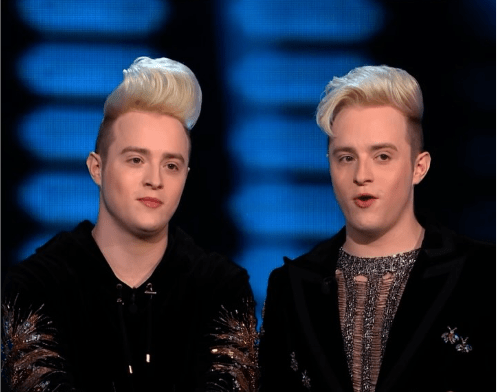Few performers in the glittering history of pop music have forged a career as surprisingly long-lasting—and lucrative—as Jedward. During the sixth season of The X Factor in 2009, the Irish twins, John and Edward Grimes, made a huge splash on television. They were initially dismissed as a novelty act, but their unbridled charm and gravity-defying hair enthralled audiences, leading to a paradoxical fame that was simultaneously ironic and unquestionably real. By 2025, their estimated net worth has grown to an impressive $8 million, which is not just based on pop hits but also includes television, brand endorsements, and business endeavors that highlight their surprisingly astute business sense.

Jedward transformed from teenage sensations into multi-platform entertainers by capitalizing on their early fame and building a cult-like fan base. They have four studio albums in their discography, and both Planet Jedward and Victory have achieved double platinum status in Ireland. Their popularity throughout Europe was further cemented when their hit songs “Under Pressure (Ice Ice Baby)” and “Lipstick” not only topped the Irish charts but also sent them to the Eurovision stage twice. Because of their brand-friendly enthusiasm, the two became popular with advertisers, landing big deals with Rowntree’s Randoms, Disney Universe, and East Midlands Trains. Their popularity on television, which includes reality shows, kid-friendly shows, and documentaries, has greatly boosted their wealth and cultural enduring appeal.
Jedward – Bio, Career and Net Worth Overview
| Attribute | Details |
|---|---|
| Full Names | John Paul Henry Daniel Richard Grimes, Edward Peter Anthony Kevin Patrick Grimes |
| Stage Name | Jedward (John & Edward) |
| Date of Birth | 16 October 1991 |
| Birthplace | Dublin, Ireland |
| Profession | Singers, TV Presenters, Reality Stars |
| Years Active | 2009 – Present |
| Estimated Net Worth | $8 Million |
| Notable Albums | Planet Jedward, Victory, Young Love, Voice of a Rebel |
| Eurovision Entries | 2011 (“Lipstick”), 2012 (“Waterline”) |
| Major TV Shows | Jedward’s Big Adventure, OMG! Jedward’s Dream Factory, Celebrity Big Brother |
| Website | planetjedward.com |
The way that people view Jedward has changed significantly in the last ten years. A case study in long-term media resilience quickly emerged from what started out as a tabloid curiosity. The twins were remarkably relevant, even though many X Factor alumni gradually faded into obscurity. Their smooth incorporation into television is largely responsible for their enduring popularity. They constantly produced engaging, uncensored content that attracted viewers and advertisers, whether they were entertaining kids in Jedward’s Big Adventure or competing against housemates in Celebrity Big Brother. Their on-screen charisma was once again demonstrated in 2017 when they came close to winning Celebrity Big Brother 19, finishing second in a finale that attracted millions of viewers.
However, their wealth is a result of a carefully layered portfolio rather than just screen time. A large portion of their revenue streams came from sponsorships with companies that offered everything from snack foods to travel services. Furthermore, Jedward welcomed the increasing power of social media, utilizing sites like Twitter and TikTok to interact with fans as well as advertise tours, merchandise, and their expanding discography. By doing this, they have established themselves as being incredibly resilient in a field of entertainment that is notorious for having short attention spans. Their influence has spread well beyond their initial target audience thanks to significantly enhanced branding tactics and an almost unmatched capacity for creating buzz.
They made a thematic shift with their 2019 album Voice of a Rebel, which was still primarily pop but featured self-produced songs and reflective lyrics. It marked a significant turning point: Jedward was fully in charge of their creative direction, even though it didn’t make it up the charts like their debut albums did. The action mirrored similar shifts made by musicians like Justin Bieber and Miley Cyrus, who abandoned their manufactured pop roots in order to regain their artistic legitimacy. The Grimes twins capitalized on their independence by taking on roles as executive producers, rights managers, and even litigators in a well-known 2017 dispute over merchandise ownership, which was later turned into a stage play that gave their already bizarre celebrity an even more bizarre dimension.
Public opinion has always wavered between admiration and contempt, but Jedward’s financial stability serves as a silent rebuke to all those who have written them off as ephemeral. As they outearned many of their peers and established an aesthetic empire based on authenticity rather than polish, their initial mockery, akin to that directed at reality stars Kim Kardashian or Paris Hilton, eventually transformed into grudging respect. David Cameron, the former prime minister of the United Kingdom, publicly supported them and even bought a T-shirt featuring their faces. Gordon Brown’s earlier remarks disparaging their talent, on the other hand, provoked a backlash and ultimately brought attention to the peculiarly divisive nature of their celebrity.
In addition to questioning accepted practices in the field, their journey has quietly changed the way that ability and tenacity are evaluated. Jedward has stayed remarkably clear about one thing in an era of hybrid fame and influencer marketing: they know how to stay visible. With agility and purpose, they continue to drive engagement, whether through TikTok livestreams from their Dublin home or the glamorous stages of Eurovision. The twins’ business-savvy choices and public acceptance of their quirkiness reflect a tendency among celebrities like Doja Cat and Billie Eilish, who are creatives who adapt their branding to fit their identities rather than the other way around.
One thing is clear even though it’s hard to predict exactly where Jedward’s empire will go next: they’ve exchanged viral moments for something noticeably more long-lasting. Their success reflects a rising value placed on perseverance over flawlessness and individuality over refinement. In a media landscape where relatability now sells better than mystique, this career model is becoming more and more relevant. Jedward’s brand is extremely versatile, whether it is launching new music, managing digital campaigns, or entering future entrepreneurial ventures. Their net worth is proof that, when supported by a successful strategy, playful doesn’t mean unserious.
